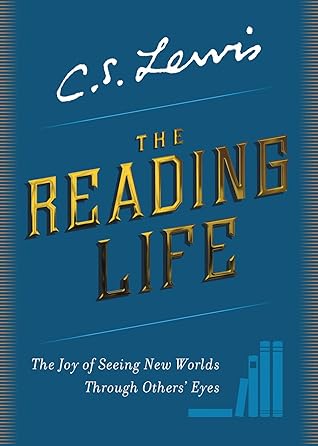More on this book
Community
Kindle Notes & Highlights
by
C.S. Lewis
Read between
May 16 - July 23, 2021
Lewis was a disciplined reader and an engaged reader.
For Lewis, reading was both a high calling and an endless source of satisfaction.
As Lewis himself explained, “Literary experience heals the wound, without undermining the privilege, of individuality. . . . In reading great literature I become a thousand men and yet remain myself. Like the night sky in the Greek poem, I see with a myriad eyes, but it is still I who see. Here, as in worship, in love, in moral action, and in knowing, I transcend myself; and am never more myself than when I do.”
WE SEEK AN ENLARGEMENT OF OUR BEING. WE want to be more than ourselves.
We want to see with other eyes, to imagine with other imaginations, to feel with other hearts, as well as with our own.
In coming to understand anything we are rejecting the facts as they are for us in favour of the facts as they are.
This, so far as I can see, is the specific value or good of literature considered as Logos; it admits us to experiences other than our own.
Those of us who have been true readers all our life seldom fully realise the enormous extension of our being which we owe to authors. We realise it best when we talk with an unliterary friend. He may be full of goodness and good sense but he inhabits a tiny world. In it, we should be suffocated. The man who is contented to be only himself, and therefore less a self, is in prison.
My own eyes are not enough for me, I will see through those of others. Reality, even seen through the eyes of many, is not enough. I will see what others have invented.
in reading great literature I become a thousand men and yet remain myself.
I see with a myriad eyes, but it is still I who see.
The sure mark of an unliterary man is that he considers ‘I’ve read it already’ to be a conclusive argument against reading a work.
Those who read great works, on the other hand, will read the same work ten, twenty or thirty times during the course of their life.
literary people are always looking for leisure and silence in which to read and do so with their whole attention. When they are denied such attentive and undisturbed reading even for a few days they feel impoverished.
a children’s story which is enjoyed only by children is a bad children’s story.
When I became a man I put away childish things, including the fear of childishness and the desire to be very grown up.
Those of us who are blamed when old for reading childish books were blamed when children for reading books too old for us. No reader worth his salt trots along in obedience to a time-table.
The true aim of literary studies is to lift the student out of his provincialism by making him ‘the spectator’, if not of all, yet of much, ‘time and existence’.
It is possible to ‘do History’ for years without knowing at the end what it felt like to be an Anglo Saxon eorl, a cavalier, an eighteenth-century country gentleman.
The fantasies did not deceive me: the school stories did.
He does not despise real woods because he has read of enchanted woods: the reading makes all real woods a little enchanted.
by confining your child to blameless stories of child life in which nothing at all alarming ever happens, you would fail to banish the terrors, and would succeed in banishing all that can ennoble them or make them endurable.
the great man, just because of his greatness, is much more intelligible than his modern commentator.
It has always therefore been one of my main endeavours as a teacher to persuade the young that firsthand knowledge is not only more worth acquiring than secondhand knowledge, but is usually much easier and more delightful to acquire.
A new book is still on its trial and the amateur is not in a position to judge it. It has to be tested against the great body of Christian thought down the ages, and all its hidden implications (often unsuspected by the author himself) have to be brought to light.
It is a good rule, after reading a new book, never to allow yourself another new one till you have read an old one in between.
Two heads are better than one, not because either is infallible, but because they are unlikely to go wrong in the same direction.
I am a product of long corridors, empty sunlit rooms, upstairs indoor silences, attics explored in solitude, distant noises of gurgling cisterns and pipes, and the noise of wind under the tiles. Also, of endless books.
eating and reading are two pleasures that combine admirably. Of course not all books are suitable for mealtime reading. It would be a kind of blasphemy to read poetry at table. What one wants is a gossipy, formless book which can be opened anywhere.
You forget that I am describing the happy life I led with Kirk or the ideal life I would live now if I could. And it is an essential of the happy life that a man would have almost no mail and never dread the postman’s knock.
Men do not long continue to think what they have forgotten how to say.
The value of the myth is that it takes all the things we know and restores to them the rich significance which has been hidden by ‘the veil of familiarity’.
The book is too original and too opulent for any final judgment on a first reading. But we know at once that it has done things to us. We are not quite the same men.


